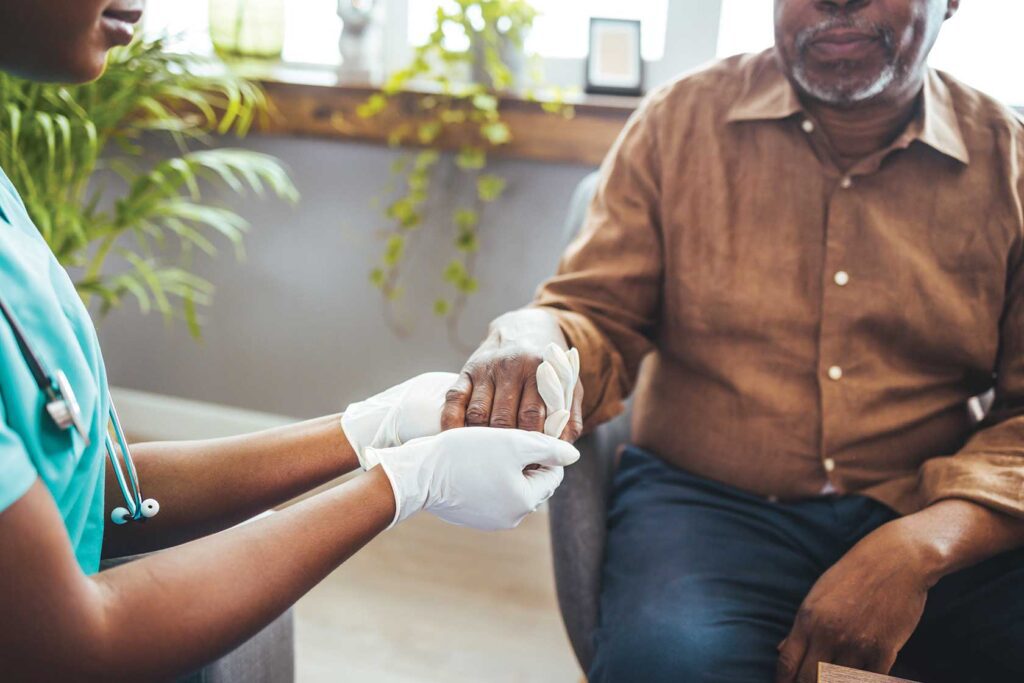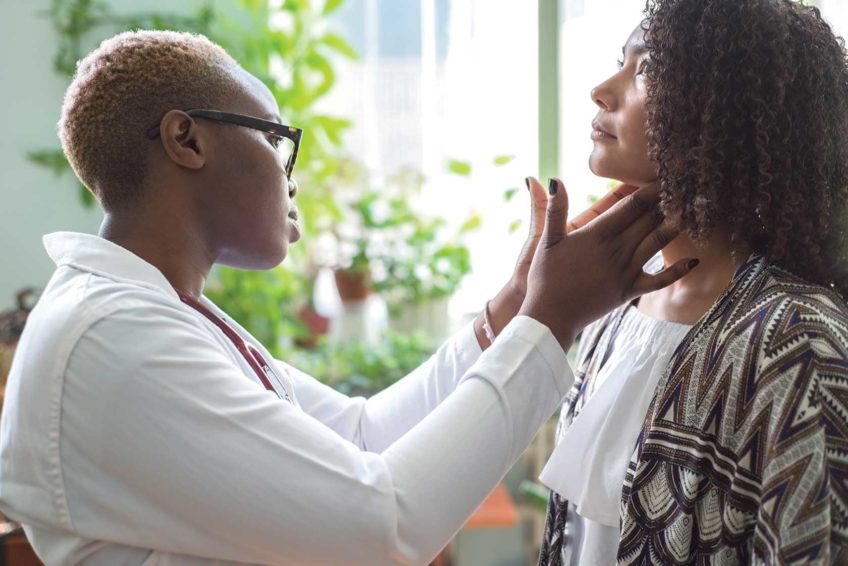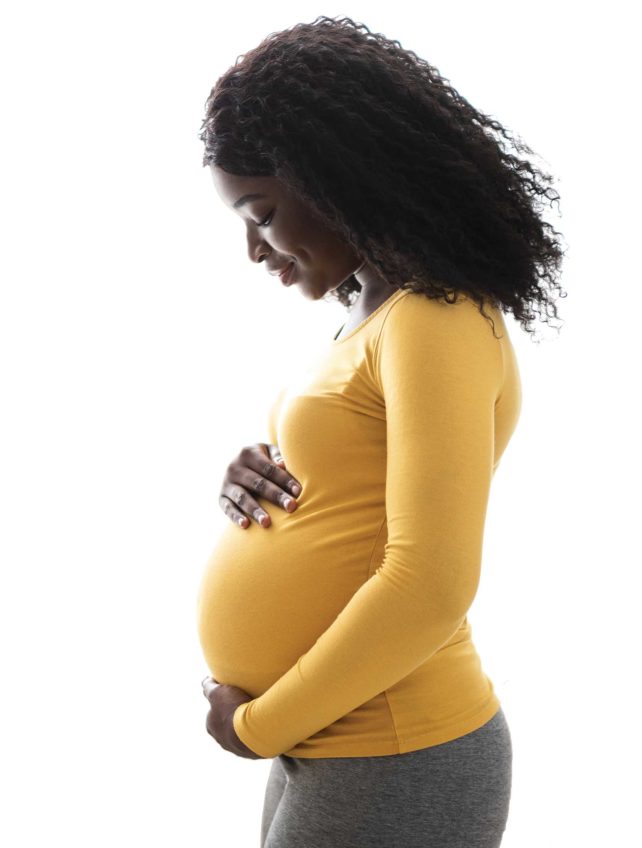
It’s pretty safe to assume that one’s colon is not a typical topic of conversation at the dinner table. Nor generally at any other time, for that matter.
Perhaps it should be.
The colon is part of the digestive system and the largest segment of the large intestine. It does yeoman work. It absorbs water and electrolytes and food that cannot be digested. More importantly, it helps keep you regular. In partnership with the rectum, it eliminates waste products or feces.
Sometimes, however, the colon acts up a bit. Diarrhea or constipation are common conditions that generally can be easily remedied and cause little consequence.
A more major concern is cancer.
Colon cancer, often referred to as colorectal cancer, is the fourth most common cancer in this country, and, according to the National Cancer Institute, the second leading cause of cancer deaths. It’s nothing to be taken lightly. More than 153,000 new cases and almost 53,000 deaths were estimated for 2023.
Blacks are hit particularly hard. African Americans are about 20% more likely to get colorectal cancer and about 40% more likely to die from it than most other groups, as noted by the American Cancer Society.
It strikes the older population. The median age at diagnosis is 66; the median age at death is 72. However, for the past 30 years the incidence of colon cancer in people under 50 has been rising steadily. A case in point is actor Chadwick Boseman, who died of colon cancer at age 43.
Symptoms

Dr. Jeffrey A. Meyerhardt, co-director of the Colon and Rectal Cancer Center at Dana-Farber Cancer Institute PHOTO: SAM OGDEN/DANA-FARBER CANCER INSTITUTE
The symptoms of colon cancer are varied. Blood in the stool, belly cramps, diarrhea are all common, and often ignored or overlooked. That’s not wise, according to Dr. Jeffrey A. Meyerhardt, the co-director of the Colon and Rectal Cancer Center at Dana-Farber Cancer Institute. “If the symptoms persist and last more than a week or two, bring it to the attention of your primary care physician,” he advised.
But sometimes there are no symptoms at all — even up to stage 4, which means the cancer has spread to other organs or parts of the body.
Screening
That’s why screening is so important. The U.S. Preventive Services Task Force in 2021 lowered the initial screening age for colon cancer to 45 for average-risk patients. Those of higher risk, however, should start five years earlier or 10 years before the youngest affected relative, whichever comes first. For example, if the relative with colon cancer developed it at age 45, family members should initiate screening at age 35.
High-risk people are those with a personal or family history of colon cancer or polyps, or an inherited condition, such as Lynch syndrome, which can increase the risk of colon cancer by as much as 60%. Even cellular changes caused by inflammatory bowel disease, such as Crohn’s disease and ulcerative colitis, can eventually become cancerous, prompting screening for colon and rectal cancer at an earlier age.
The recommended screening for high-risk people is the colonoscopy, the gold standard of screening. In this procedure, the doctor inserts a long flexible tube with a light and camera attached at one end. The procedure examines the entire colon and rectum, looking for polyps that can become cancerous. All polyps are removed. A laxative the day before the procedure is required to thoroughly clean the bowels. Depending on the findings, the colonoscopy is repeated every five to 10 years.
A colon polyp is a small clump of cells of varying shapes that forms on the lining of the colon. Not all are cancerous. “Ones that are more irregular shaped or more abnormal looking are more likely to be cancerous,” explained Meyerhardt.

The colon is part of the digestive system and the longest section of the large intestine. It turns undigested food into feces to allow excretion from the body through the rectum and anus. Colon cancer is the fourth most common cancer in the country and the second deadliest. IMAGE: Mayo Foundation for Medical Education and Research
Those of average risk have a choice of several other tests. Stool-based tests look for hidden blood in the stool. The Cologuard, however, also looks for small amounts of tumor DNA. The sigmoidoscopy examines only the rectum and lower part of the colon. A virtual colonoscopy uses particular types of x-rays to make a series of pictures of the colon.
Polyps cannot be removed during stool-based tests and virtual colonoscopy. Also, if a problem is detected in any of these tests, a colonoscopy is then recommended.
But here’s the problem. Although there is a myriad of tests available for screening, not everyone has taken advantage. According to a study by the Centers for Disease Control and Prevention, the percentage of adults aged 50 to 75 years who reported being up to date with colorectal cancer screening in 2020 was 69.4%. Almost 22% of U.S. adults have never been screened.
The screening test used depends on the individual’s circumstances. Regardless, screening should be initiated at a certain age. As doctors have so aptly put it: “The best test is the one that gets done.”
Once cancer is detected, treatment typically includes surgery, chemotherapy and radiation.
Risk Reduction
Screening tests help detect a problem, but there are things a person can do to reduce the risk of colon cancer altogether. One’s weight is a critical factor. According to the National Cancer Institute, colorectal cancer is 1.3 times as likely in people with obesity.
That’s because overweight and obesity can cause changes in the body including inflammation, which is strongly linked to colon cancer. The risk of cancer increases with the more excess weight a person gains and the longer a person is overweight.
Lack of regular physical activity and unhealthy diets are additional risk factors. The U.S. Department of Health and Human Services recommends 150 minutes a week of aerobic activities, such as walking and biking. Diets should include fruits, veggies and fiber. The American Institute for Cancer Research recommends a daily dose of 30 grams of fiber, as found in beans, brown rice and whole wheat bread.
Limit alcohol to one drink a day for women and two a day for men. No level of smoking is advised.
A pill a day might be a factor. Observational studies published by the National Institutes of Health suggest that higher levels of vitamin D3 are associated with a reduced risk of colorectal cancer as well as improved survival of colorectal cancer patients. 600 IU a day is the minimum recommended dosage.
Even your gut may play a role. Microbiome refers to bacteria in the gastrointestinal tract. “Bacteria in the gut is normal,” explained Meyerhardt. “But we are starting to learn that unhealthy levels of certain bacteria can increase risk of multiple types of cancers, including colon.” It is not yet possible, however, to screen for what are good and bad bacteria or alter those levels to reduce risk.
The bottom line
The bottom line is colon cancer is one of the few cancers that can be prevented. It just takes doing on your part. Only through screening can a polyp be detected and removed thereby preventing cancer from forming.
You just have to look for it.
Signs and symptoms
- A change in bowel habits, such as diarrhea, constipation or narrowing of the stool
- Rectal bleeding or blood in the stool
- Cramping or belly pain
- A feeling that the bowel doesn’t empty all the way during a bowel movement
- Weakness or fatigue
- Losing weight without trying
Source: American Cancer Society
Risk factors
- Age – increases with age
- Family history
- Race – more common in Blacks
- Personal or family history of polyps
- Inflammatory bowel disease
- Genetic syndromes
- Lifestyle
– Smoking
– Obesity
– Excessive alcohol use
– Diet low in fruits and veggies
– Sedentary lifestyle








